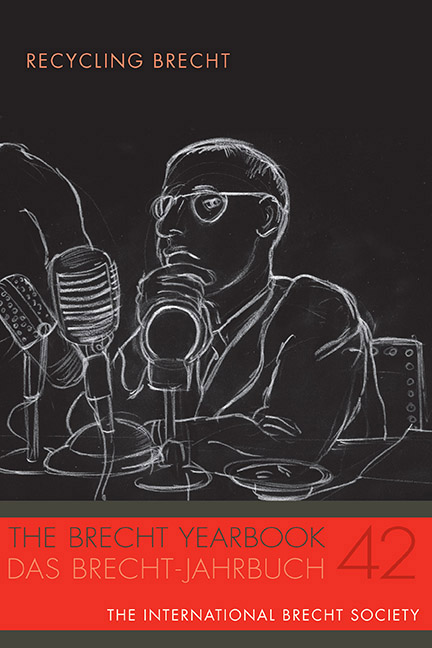“Altes wird Aufgerollt”: Paul Dessau’s Posthumous Collaborations with Brecht
Published online by Cambridge University Press: 09 April 2021
Summary
Die … Technik der Übernahme … ist auch von Brecht. Er hat einmal zu mir gesagt: “Weißt du, wenn man etwas Gutes gemacht hat, soll man es wieder aufnehmen und in anderem Rahmen nochmal verwenden.”
[The … technique of borrowing … is also from Brecht. He once said to me: “You know, if you’ve done something good you should take it up again and use it once more in a different context.”]
Collaboration
From the beginning of their collaboration in 1943 through to 1956, Paul Dessau was Brecht's most innovative and experimental musical collaborator. During Brecht's lifetime he provided the music for productions of Mutter Courage und ihre Kinder (Mother Courage and Her Children), Der kaukasische Kreidekreis (The Caucasian Chalk Circle), Der gute Mensch von Sezuan (The Good Person of Szechwan), Mann ist Mann (Man Equals Man), Herrnburger Bericht (Report from Herrnburg), Die Erziehung der Hirse (The Cultivation of the Millet), for the opera Die Verurteilung des Lukullus (The Condemnation of Lukullus), alongside dozens of songs and occasional pieces including what is purportedly the most-sung political song of the German Democratic Republic, the “Aufbaulied der FDJ” (Reconstruction Song for the Free German Youth). Dessau was also, through to his death in 1979, the most important avant-garde composer of the GDR; its leading practitioner of serialism; a noted composer of film music (not least for four documentary films of Andrew and Annelie Thorndike); and a mediator between East and West, bringing Luigi Nono, Hans Werner Henze, and others to East Berlin and arranging performances of their works. Some of his own compositions were suppressed or censored; he was a tireless supporter and protector of younger, experimental composers (including Friedrich Goldmann and Reiner Bredemeyer); and a longterm collaborator with Brechtian writers including Heiner Müller, Volker Braun, and Karl Mickel. Müller wrote in his obituary for the composer:
Er hielt für lernbar, was gebraucht wird… . Ich habe viel von ihm gelernt. Das Beispiel seiner Arbeitshaltung. Sie hatte den Ernst des Kinderspiels. Das die avancierteste Weise der Produktion ist, Arbeit auf höchstem Niveau, ein Vorgriff in das Reich der Freiheit.
- Type
- Chapter
- Information
- The Brecht Yearbook / Das Brecht-Jahrbuch 42Recycling Brecht, pp. 85 - 102Publisher: Boydell & BrewerPrint publication year: 2018



